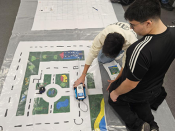Por Ian Baldwin (Director of the Department of Molecular Ecology, Max Planck Institute for Chemical Ecology).
Plants are rooted at the base of most food chains on this planet, but being passive food for the rest of planet’s heterotrophs is not the role they have chosen. This talk will describe three decades of research into how a native tobacco plant, Nicotiana attenuata, that lives in the Great Basin Desert of the SW USA has been developed into a model system for the study of all types of plant-ecological interactions, particularly those biotic interactions that dominate the agricultural niche. This plant recognizes attack from specific herbivore species by the particular chemistry of the herbivore’s saliva, and uses this recognition to tailor a complicated 6-layered defense response that requires a remodeling of the plant’s transcriptome, metabolome and proteome, as well as some of its life history traits. The science writer, Michael Pollan, inverted the relationship between humans and their domesticated plants to argue that it was plants that domesticated humans, and not vice versa. Nicotiana attenuata has had designs more Machiavellian than domestication for the heterotrophs that feed on it and the adage “you are what you eat” is only just the beginning. By training students in the lost art of natural history discovery, we have used the plant’s natural history interactions to phenotype transformed and recombinant inbred lines (RILs) of this plant, in a nature preserve in the plant’s native habitat, to understand the function of genes required for survival in nature. This talk will describe what 5 native insect herbivores have taught us about traits that are essential for plant function. The 5 insects come from different feeding guilds, attack different tissues at different developmental stages and have revealed different traits that are essential for plant survival.





















